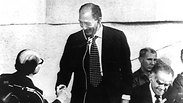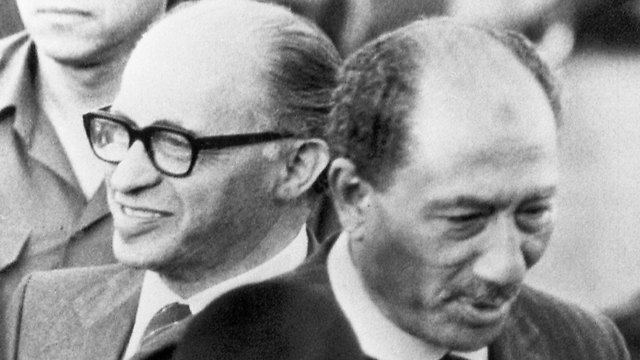
As Israel marks 40 years since Sadat's visit, Egyptians refuse to join the party
Analysis: In Cairo, which initiated the move that led to a peace agreement with Jerusalem, there is no desire to celebrate and no nostalgia. The only thing the Egyptians are doing is analyzing the motives of the dramatic decision made by their president in 1977. Israel is an established fact even in the changing reality, but normalization is a different story.
The speech was long and boring, but suddenly it took a dramatic turn. Sadat changed his tone, raised his voice and dropped the bomb: I am willing, he declared, to travel with my peace initiative to the end of the world, even to Jerusalem. And he immediately added: I want to enter (the Israelis’) hearts, break the psychological barrier.
No one, apart from a small group of confidants, knew at the time—neither here nor there—what was being concocted behind the scenes. Foreign Minister Moshe Dayan and Hassan Tuhami, the Egyptian president’s strange adviser, met somewhere in Morocco. The two finalized the “understandings” ahead of the visit: Without a full withdrawal from Sinai, Sadat wouldn’t have arrived.

Sadat embarked on a series of visits to Arab states, seeking partners for peace. Syrian President Hafez Assad, Bashar’s father, not only firmly refused to join Sadat, but even planned to hold him in custody in Syria until he calmed down or blow up his plane over Cyprus. Fortunately, the Americans found out about the assassination plot and thwarted it.
On November 19, he arrived in Israel. Up to the very last moment, there were quite a few people in Israel who suspected that the Egyptian plane’s door would open and an armed terror cell would burst out with drawn weapons and try to assassinate all the VIPs standing along the red carpet at Ben-Gurion Airport. The entire political echelon was there, led by Prime Minister Menachem Begin. The suspicions were so strong, that the Sayeret Matkal elite unit was sent behind the plane, just in case.
Was the psychological barrier broken? In the immediate run, yes. The peace agreements were signed, embassies were opened in Tel Aviv and in Cairo, Israeli tourists flocked to see the pyramids, and occasionally, brave visitors arrived from Egypt too. But as we moved forward, the wall of hostility and abhorrence toward Israel grew higher.
Suddenly, we learned of the professional associations and the boycott and punishments against anyone “caught in an act of normalization with the Zionist enemy.” The cooperation came to an end. It was the punishment imposed on Sadat by the associations and the intellectuals for his failure to update them or consult them before flying to Jerusalem.
Physicians from Cairo refused to exchange a word with Israeli colleagues. Writers declared a boycott. In the Egyptian theater, actors jumped out of the window to avoid actors from Tel Aviv’s Cameri Theater. Until the past decade, you couldn’t glance at an Egyptian newspaper without spotting inciting articles and cartoons reeking of anti-Semitism. That’s how the face of cold peace took shape.
Egypt suffered too. In 1979, immediately after the peace treaty was signed, Arab states declared a boycott on Egypt and the Arab League headquarters were moved from Cairo to Tunis. Sadat was murdered, and his widow Jehan still insists that “he knew, and I knew, that he would be murdered because of the peace with Israel.”
Two events will be held simultaneously this Wednesday, in Jerusalem and in Cairo: President Reuven Rivlin has invited all the people who were involved in the historic visit to his residence. All those who are still alive will attend: Israel’s former ambassadors to Egypt, experts on Middle Eastern affairs from the academia, journalists and businesspeople who keep trying to open the locked gates on the Egyptian side.
In Cairo, Ambassador David Govrin will invite his guests to mark 40 years since the historic event. As always, until the very last moment, he won’t know who is coming and who will apologize for their “absence.” Because in Egypt, which initiated the whole move, there is no desire to celebrate and there is no nostalgia.
The only thing they are doing to mark the event is analyzing the motives of Sadat’s dramatic decision. What he went through in his days of seclusion in Sinai and in Romania, who he consulted, if he even consulted anyone, and why did he believe he would succeed in shattering the barriers between the people. His widow, who turned down the invitation to come to Israel, is actually giving nonstop interviews in Cairo. Israel is an established fact even in the changing reality, but normalization is a different story.











